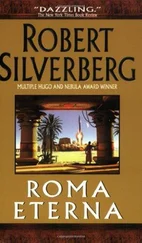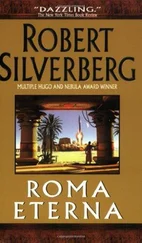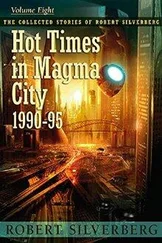Robert Silverberg - Breckenridge and the Continuum
Здесь есть возможность читать онлайн «Robert Silverberg - Breckenridge and the Continuum» весь текст электронной книги совершенно бесплатно (целиком полную версию без сокращений). В некоторых случаях можно слушать аудио, скачать через торрент в формате fb2 и присутствует краткое содержание. Год выпуска: 2009, ISBN: 2009, Издательство: Subterranean Press, Жанр: Фантастика и фэнтези, на английском языке. Описание произведения, (предисловие) а так же отзывы посетителей доступны на портале библиотеки ЛибКат.
- Название:Breckenridge and the Continuum
- Автор:
- Издательство:Subterranean Press
- Жанр:
- Год:2009
- ISBN:978-1-59606-212-2
- Рейтинг книги:3 / 5. Голосов: 1
-
Избранное:Добавить в избранное
- Отзывы:
-
Ваша оценка:
- 60
- 1
- 2
- 3
- 4
- 5
Breckenridge and the Continuum: краткое содержание, описание и аннотация
Предлагаем к чтению аннотацию, описание, краткое содержание или предисловие (зависит от того, что написал сам автор книги «Breckenridge and the Continuum»). Если вы не нашли необходимую информацию о книге — напишите в комментариях, мы постараемся отыскать её.
Breckenridge and the Continuum — читать онлайн бесплатно полную книгу (весь текст) целиком
Ниже представлен текст книги, разбитый по страницам. Система сохранения места последней прочитанной страницы, позволяет с удобством читать онлайн бесплатно книгу «Breckenridge and the Continuum», без необходимости каждый раз заново искать на чём Вы остановились. Поставьте закладку, и сможете в любой момент перейти на страницу, на которой закончили чтение.
Интервал:
Закладка:
As they moved cityward Militor and Arios chattered compulsively, falling after a while into a quarrel over certain obscure and controversial points of historical theory. Breckenridge had heard them have their argument at least a dozen times in the last two weeks, and no doubt they had been battling it out for years. The main area of contention was the origin of the city. Who were its builders? Militor believed they were colonists from some other planet, strangers to earth, representatives of some alien species of immeasurable grandeur and nobility, who had crossed space thousands of years ago to build this gigantic monument on Asia’s flank. Nonsense, retorted Arios: the city was plainly the work of human beings, unusually gifted and energetic but human nonetheless. Why multiply hypotheses needlessly? Here is the city; humans have built many cities nearly as great as this one in their long history; this city is only quantitatively superior to the others, merely a little bigger, merely a bit more daringly conceived; to invoke extraterrestrial architects is to dabble gratuitously in fantasy. But Militor maintained his position. Humans, he said, were plainly incapable of such immense constructions. Neither in this present decadent epoch, when any sort of effort is too great, nor at any time in the past could human resources have been equal to such a task as the building of this city must have been. Breckenridge had his doubts about that, having seen what the twentieth century had accomplished. He tended to side with Arios. But indeed the city was extraordinary, Breckenridge admitted: an ultimate urban glory, a supernal Babylon, a consummate Persepolis, the soul’s own hymn in brick and stone. The wall that girdled it was at least two hundred feet high—why pour so much energy into a wall? were no better means of defense at hand, or was the wall mere exuberant decoration?—and, judging by the easy angle of its curve, it must be hundreds of miles in circumference. A city larger than New York, more sprawling even than Los Angeles, a giant antenna of turbulent consciousness set like a colossal gem into this vast plain, a throbbing antenna for all the radiance of the stars: yes, it was overwhelming, it was devastating to contemplate the planning and the building of it, it seemed almost to require the hypothesis of a superior alien race. And yet he refused to accept that hypothesis. Arios, he thought, I am with you.
The city was uninhabited, a hulk, a ruin. Why? What had happened here to turn this garden plain into a salt-crusted waste? The builders grew too proud, said Militor. They defied the gods, they overreached even their own powers, and stumbling, they fell headlong into decay. The life went out of the soil, the sky gave no rain, the spirit lost its energies; the city perished and was forgotten, and was whispered about by mythmakers, a city out of time, a city at the end of the world, a mighty mass of dead wonders, a habitation for jackals, a place where no one went. We are the first in centuries, said Scarp, to seek this city.
Halfway between dawn and noon they reached the wall and stood before the great gate. The gate alone was fifty feet high, a curving slab of burnished blue metal set smoothly into a recess in the tawny stucco of the wall. Breckenridge saw no way of opening it, no winch, no portcullis, no handles, no knobs. He feared that the impatient Militor would merely blow a hole in it. But, groping along the base of the gate, they found a small doorway, man-high and barely man-wide, near the left-hand edge. Ancient hinges yielded at a push. Scarp led the way inside.
The city was as Breckenridge remembered it from his dream: the cobbled plaza, the broad avenues, the humped and rubbery buildings. The fierce sunlight, deflected and refracted by the undulant roof lines, reverberated from every flat surface and rebounded in showers of brilliant energy. Breckenridge shaded his eyes. It was as though the sky were full of pulsars. His soul was frying on a cosmic griddle, cooking in a torrent of hard radiation.
The city was inhabited.
Faces were visible at windows. Elusive figures emerged at street corners, peered, withdrew. Scarp called to them; they shrank back into the hard-edged shadows.
“Well?” Arios demanded. “They’re human, aren’t they?”
“What of it?” said Militor. “Squatters, that’s all. You saw how easy it was to push open that door. They’ve come in out of the desert to live in the ruins.”
“Maybe not. Descendants of the builders, I’d say. Perhaps the city never really was abandoned.” Arios looked at Scarp. “Don’t you agree?”
“They might be anything,” Scarp said. “Squatters, descendants, even synthetics, even servants without masters, living on, waiting, living on, waiting—”
“Or projections cast by ancient machines,” Militor said. “No human hand built this city.”
Arios snorted. They advanced quickly across the plaza and entered into the first of the grand avenues. The buildings flanking it were sealed. They proceeded to a major intersection, where they halted to inspect an open circular pit, fifteen feet in diameter, smooth-rimmed, descending into infinite darkness. Breckenridge had seen many such dark wells in his vision of the night before. He did not doubt now that he had left his sleeping body and had made an actual foray into the city last night.
Scarp flashed a light into the well. A copper-colored metal ladder was visible along one face.
“Shall we go down?” Breckenridge asked.
“Later,” said Scarp.
The famous anthropologist had been drinking steadily all through the dinner party—wine, only wine, but plenty of it—and his eyes seemed glazed, his face flushed; nevertheless he continued to talk with superb clarity of perception and elegant precision of phrase, hardly pausing at all to construct his concepts. Perhaps he’s merely quoting his own latest book from memory, Breckenridge thought, as he strained to follow the flow of ideas. “—A comparison between myth and what appears to have largely replaced it in modern societies, namely, politics. When the historian refers to the French Revolution it is always as a sequence of past happenings, a nonreversible series of events the remote consequences of which may still be felt at present. But to the French politician, as well as to his followers, the French Revolution is both a sequence belonging to the past—as to the historian—and an everlasting pattern which can be detected in the present French social structure and which provides a clue for its interpretation, a lead from which to infer the future developments. See, for instance, Michelet, who was a politically minded historian. He describes the French Revolution thus: ‘This day…everything was possible…future became present…that is, no more time, a glimpse of eternity.’” The great man reached decisively for another glass of claret. His hand wavered; the glass toppled; a dark red torrent stained the table cloth. Breckenridge experienced a sudden terrifying moment of complete disorientation, as though the walls and floor were shifting places: he saw a parched desert plateau, four hooded figures, a blazing sky of strange constellations, a pulsating aurora sweeping the heavens with old fire. A mighty walled city dominated the plain, and its frosty shadow, knifeblade-sharp, cut across Breckenridge’s path. He shivered. The woman on Breckenridge’s right laughed lightly and began to recite:
I saw Eternity the other night
Like a great ring of pure and endless light.
All calm, as it was bright;
And round beneath it, Time in hours, days, years,
Driv’n by the spheres
Like a vast shadow mov’d; in which the world
And all her train were hurl’d.
“Excuse me,” Breckenridge said. “I think I’m unwell.” He rushed from the dining room. In the hallway he turned toward the washroom and found himself staring into a steaming tropical marsh, all ferns and horsetails and giant insects. Dragonflies the size of pigeons whirred past him. The sleek rump of a brontosaurus rose like a bubbling aneurysm from the black surface of the swamp. Breckenridge recoiled and staggered away. On the other side of the hall lay the desert under the lash of a frightful noonday sun. He gripped the frame of a door and held himself upright, trembling, as his soul oscillated wildly across the hallucinatory eons. “I am Scarp,” said a quiet voice within him. “You have come to the place where all times are one, where all errors can be unmade, where past and future are fluid and subject to redefinition.” Breckenridge felt powerful arms encircling and supporting him. “Noel? Noel? Here, sit down.” Harry Munsey. Shiny pink skull, searching blue eyes. “Jesus, Noel, you look like you’re having some kind of bad trip. Merry sent me after you to find out—”
Читать дальшеИнтервал:
Закладка:
Похожие книги на «Breckenridge and the Continuum»
Представляем Вашему вниманию похожие книги на «Breckenridge and the Continuum» списком для выбора. Мы отобрали схожую по названию и смыслу литературу в надежде предоставить читателям больше вариантов отыскать новые, интересные, ещё непрочитанные произведения.
Обсуждение, отзывы о книге «Breckenridge and the Continuum» и просто собственные мнения читателей. Оставьте ваши комментарии, напишите, что Вы думаете о произведении, его смысле или главных героях. Укажите что конкретно понравилось, а что нет, и почему Вы так считаете.












